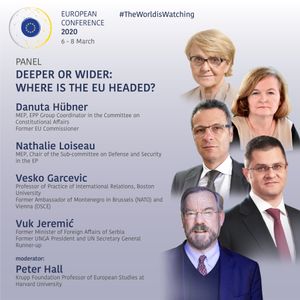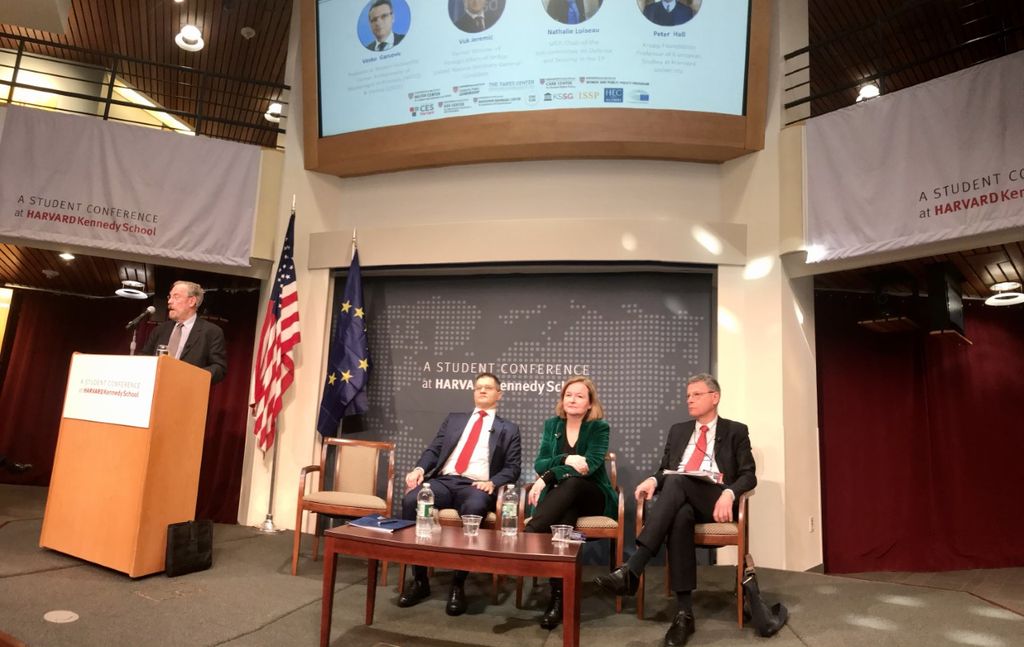Garcevic Speaks at European Conference 2020
Ambassador Vesko Garcevic, Professor of the Practice of International Relations at the Frederick S. Pardee School of Global Studies at Boston University, was a panelist at a European Conference 2020, held at the Kennedy School of Government at Harvard Kennedy School on March 7, 2020.
The European Conference is an annual conference on European and Transatlantic Affairs convened by students from the Harvard Kennedy School of Government, Harvard Business School, MIT Sloan School of Management, and the Fletcher School of Law and Diplomacy at Tufts University.The Conference got together senior policy makers from the EU, faculty and practitioners who are involved in the European Affairs.
 The panel “Deeper or Wider: Where is the EU headed?” was moderated by Peter Hall, Professor of European Studies at Harvard University. The panel included European Parliamentarians, Danuta Hübner, a member of the Committee of Constitutional Affairs, Nathalie Loiseau, the chief of the Sub-committee on Defense and Security in the EP, as well as Vuk Jeremić, former President of the UN General Assembly and the UN Secretary Genera Runner-up.
The panel “Deeper or Wider: Where is the EU headed?” was moderated by Peter Hall, Professor of European Studies at Harvard University. The panel included European Parliamentarians, Danuta Hübner, a member of the Committee of Constitutional Affairs, Nathalie Loiseau, the chief of the Sub-committee on Defense and Security in the EP, as well as Vuk Jeremić, former President of the UN General Assembly and the UN Secretary Genera Runner-up.
With the new Commission in place, the Conference on the Future of Europe to be launched on May 9 this year, the panelists debated what we could expect in the coming years – further integration, further enlargement, or both. Amb. Garcevic discussed relations between the EU and NATO, and EU military capabilities, including efforts to establish a European army. While he underlined the need for the EU to play a more autonomous role in the field of defense, Amb. Garcevic posed a question about the character of a possible EU army and how it would complement with NATO.
While considering the enlargement of the EU, a few panelists, including Amb. Garcevic expressed their doubts about the pace of the process, asking whether the EU expansion still enjoys the support of the member states. He described the process as “brain death”, which can be detrimental for the democratic reforms of aspiring candidate states. Garcevic highlighted the growing political and economic influence of Russia and China in EU candidate states and argued that it is the direct consequence of EU’s waning political engagement in this part of Europe.
During his diplomatic career, Amb. Vesko Garcevic dealt with issues pertinent to European security and NATO for almost 14 years. In 2004, he was posted in Vienna to serve as Ambassador to Organization for Security and Cooperation in Europe. He had been a Montenegro’s Ambassador to NATO from 2010 until 2014 and served as a Montenegro’s National Coordinator for NATO from 2015 until he joined the faculty at the Pardee School.
